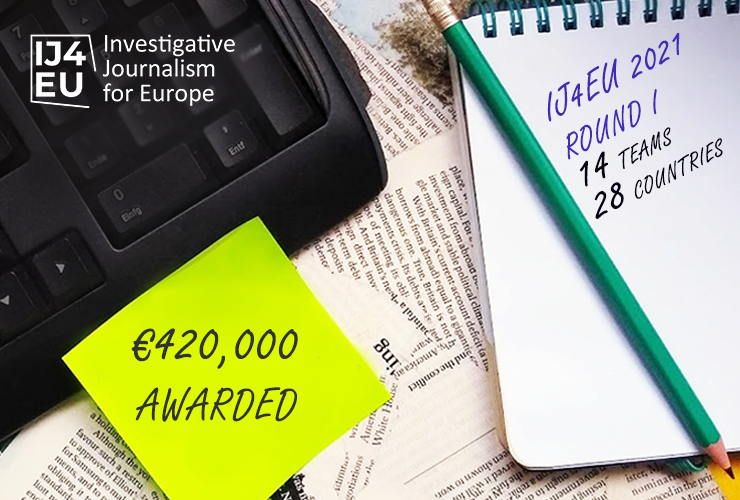An independent jury has awarded a combined €420,000 to 14 cross-border reporting teams under the first call of the year for the IJ4EU fund’s Investigation Support Scheme.
The grants will allow journalists across the European Union and beyond to collaborate on topics ranging from organised crime and corruption to “fake green finance” and conflicts of interest in COVID-19 research.
Run by the Vienna-based International Press Institute (IPI), the Investigative Support Scheme is the flagship grant programme of the Investigative Journalism for Europe (IJ4EU) fund.
In 2021, the scheme will disburse €835,000, offering grants of up to €50,000 to journalistic teams probing transnational subjects of public interest. A second call will open shortly in August.
In no particular order, the successful projects chosen under the first call were:
- A cross-border team of science and data journalists investigating conflicts of interest in COVID-19 research and decision-making – €18,000
- A Bellingcat-led investigation into a corporate vehicle linked to international money laundering and corruption – €42,560.50
- A cross-border investigation led by Voxeurop into the environmental devastation wrought by fake green finance – €34,770
- Coda Story leads a cross-border investigation into the players and policies driving key European battles over history – €43,400
- A cross-border investigation led by info.nodes into organised crime in Europe – €13,450
- An international team probing who is busting Belarus sanctions in the Baltics – €30,068.82
- A Maldita-led investigation into how the companies behind popular apps handle users’ data – €14,985.56
- A Border Forensics investigation into transformations in the policing of Europe’s borders – €46,502
- A Lost in Europe investigation into underage migrants convicted of human trafficking in the Mediterranean – €48,660
- A cross-border investigation led by Info Sud-Est into crime and corruption on the Black Sea – €48,650
- An investigation led by Investigative Reporting Denmark into failures to protect European agricultural workers from pesticides – €19,345
- A cross-border investigation into the pernicious influence of a far-right publisher in Europe – €26,250
- A cross-border investigation using open-source intelligence into third-party lobbying of European and national tobacco legislation – €14,963.97
- A cross-border investigation led by Oštro into how white-collar crime flourishes between Slovenia and Croatia – €18,108
Independence sacred
The Investigation Support Scheme runs alongside a separate IJ4EU funding and mentoring scheme designed exclusively for freelancers. Grantees of the Freelancer Support Scheme, which has just one call in 2021, will be announced shortly.
Editorial independence is the cornerstone of both schemes. IJ4EU’s financing model allows public and philanthropic money to support world-class investigative journalism in Europe without fear or favour.
Ninety percent of IJ4EU’s coffers come from the European Commission, channeled via a consortium of independent intermediary organisations led by IPI. The other members of the consortium are the Maastricht-based European Journalism Centre and the European Centre for Press and Media Freedom in Leipzig.
An independent jury of senior editors and investigative journalism specialists is key to the integrity of the selection process, guaranteeing a firewall between IJ4EU’s donors and grantees.
Under the first round of the 2021 Investigation Support Scheme, more than 60 cross-border teams from across Europe applied for a combined €1.9 million in funding.
Successful applicants had team members based in 22 EU member states plus six nations further afield.
The five-person jury — whose identities will be kept secret until the results of the scheme’s second call are made public in the autumn — chose the projects according to criteria including newsworthiness, cross-border relevance, the strength of the research and publication plan and financial need.
Now in its third year, IJ4EU has a war chest of €1.1 million in grants in 2021, alongside other forms of assistance such as mentoring, editorial support and legal help.
Following a successful pilot scheme in 2018, IJ4EU last year allocated €1.07 million in grants to 49 cross-border teams of journalists based all across Europe.
The result was more than 600 stories published by around 250 media outlets, reaching tens of millions of people. See the projects section and impact page on the IJ4EU site for more information.
